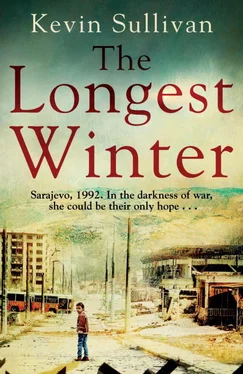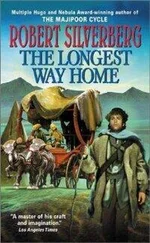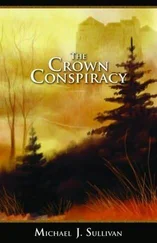They were close to a sniper area. People hurried past. A Ukrainian officer stood behind the APC smoking a cigarette. There were eight lorries in the convoy, with a second APC in the rear. The officer was trying, lazily, to get the vehicles in the convoy to reverse. He lifted his cigarette hand and flicked it, as if waving away a beggar in the street. He wanted them to make room so that the lead APC could take another shot at the corner.
It took them five minutes to extricate the Fiat from the ditch. Alija hit the steering wheel with his hands several times to relieve his impatience. There wasn’t another route to Alipašino.
The Ukrainians and the Fiat people argued and swore. At last, when the car was clear, the APC began to reverse. It got round the corner after two more unsuccessful attempts.
For forty years the Ukrainians had threatened to roll across north Germany with the rest of the Warsaw Pact. Now they couldn’t roll from one part of the city to another without getting stuck. The Ukrainian UN troops hadn’t been paid for months. They were notorious black marketeers. Alija, like everyone else, got his petrol from the Ukrainians. They bought cars and stereos, and their APCs were always running out of fuel.
The convoy began to lumber past and the cars ahead of Alija started to move. There was a huge line of people outside the bakery waiting for bread, and it had begun to snow again. The sky was low and grey and the temperature was well below freezing.
After the bakery the traffic eased. Alija reached Alipašino around seven. Milena’s apartment block was built on a steep hill, exposed on all sides to shellfire. Two teenagers stood in the entrance. ‘Where are you going?’ one of them asked. He was about eighteen. He had a beard that hadn’t grown properly and he wore a jacket that was too thin to protect him from the cold. The other boy clapped gloved hands against his thighs trying to warm up. All the apartment blocks had guard committees. Alija couldn’t imagine these two youngsters offering much resistance if the Rebels entered the city, but he knew he would start to believe the war was lost if kids like this were too scared or too indifferent to stand in the cold and go through the motions of defending their homes. He showed them his military ID and they stood aside. The younger one tried a salute.
The temperature in the tiled lobby was lower than the temperature outside. It was like stepping into a deep freeze. Alija walked past the defunct lift to the dark and dirty stairway. On the sixth floor there were workmen. He stopped to catch his breath and ask what was going on.
One of the men looked up, shrugged. ‘Direct hit last night.’
‘Anyone hurt?’
The man shook his head.
Alija was perspiring by the time he reached the sixteenth floor. It was dangerous to break into a sweat in these temperatures.
There was no reply when he knocked on her door. He couldn’t hear any sound from inside. The door of the apartment opposite opened and an old woman looked out. She stood with her hand on the door ready to close it quickly.
‘She hasn’t come home,’ Mrs Hatibović said. ‘Who are you?’
She peered at Alija through thick glasses.
These buildings weren’t designed to freeze, he thought. They weren’t designed to be dark. Now pensioners live amid concrete ice blocks – soft tissue and old bones in darkness and cold. Our ideas of ease and security are no more than memories. He knew if he stepped towards her she would close the door.
‘I’m a friend of Milena,’ he said. ‘I have a letter for her.’
She relaxed but kept her hand on the door. ‘She’s usually home about now, but she didn’t come back last night,’ she said. ‘I can give her your letter.’
He wasn’t sure. He was wasting time. He stood in the dark waiting to decide, and his instinct told him not to hand over the envelope.
‘Please tell her I was here,’ he muttered. ‘My name’s Alija. I have a letter from Jusuf.’
Mrs Hatibović nodded. ‘She usually tells us when she isn’t going to be home,’ she said.
‘I’m sure she’s fine.’
Outside, the two teenage sentries and some other boys were standing next to his car. They moved out of the way when he appeared.
She usually tells us when she isn’t going to be home , the old woman said.
At the bakery people were still queuing in the snow. One shell would wreak havoc there.
There were a hundred people in the city more important to Alija than Milena Ristić. But she hadn’t turned up for work. She hadn’t gone back to her own apartment. She might have stayed with friends. But Alija knew she hadn’t.
He drove into the forecourt of the State Hospital. It was quiet in the lobby but the corridor next to the downstairs operating theatre was full of people. He found Jurić.
‘You should have stayed for breakfast,’ Jurić said. ‘We had chocolate!’ He’d already been working for an hour. ‘That man your boss brought from Otes last night is comfortable. We took lots of shrapnel out of him. Maybe it can be recycled.’
In Jurić’s office there were two cardboard boxes. ‘Syringes and bandages,’ Jurić said, indicating the smaller box. ‘Bandages,’ he pointed to the larger one. ‘And that’s all we have. Wish we could give you more, but we can’t.’
As Jurić was leaving, Alija said, ‘Can I see your casualty list for last night?’
‘First floor,’ Jurić said. ‘Ask the sister in casualty.’
Alija found the sister in the hall. She was talking very quietly and firmly to a woman who was crying. The woman’s daughter was dead. The sister was gentle and steady.
A middle-aged man stood nearby. He was unshaven and badly dressed and he had a tattoo on the back of his left hand.
‘Ivo will take you home,’ the sister told the woman.
Ivo stepped forward. He patted the bereaved mother’s shoulder. ‘I’ll get you back and we’ll find some neighbours to take care of things. Come on, pet.’ He took her hand and helped her to her feet.
Alija asked for the casualty list. The sister went into the theatre next to the corridor and came back with a clipboard. Alija examined the names. Milena’s wasn’t among them.
He was already nearly an hour behind schedule, but in the car he decided to make a detour.
The Koševo Hospital was larger than the State Hospital. Like the State Hospital, bits of the Koševo had been blown away. It was wrecked. He showed his card to the policeman on duty at the casualty entrance. The man directed him to an office on the first floor where he found a nurse and asked to see their register of casualties treated in the last twenty-four hours.
The nurse wasn’t impressed by Alija’s ID. ‘You’ll have to see the director,’ she said.
‘Where can I find him?’
She sighed in a bad-tempered way and then said, ‘Wait here, I’ll get him.’
The doctor was in his fifties, with a balding head and thick grey beard. He was very short. He walked towards Alija with quick, important steps and looked up at him with beady eyes.
‘Yes?’
‘I’d like to see last night’s casualty record.’
‘The nurse could have shown you that!’ the doctor barked. He walked over to a table on the other side of the room and picked up a ledger. Alija followed the little man and looked down at a list of names written in longhand. Beside each name was an admission time and a record of treatment.
‘What name are you looking for?’
Alija saw it halfway down the right-hand page. He pointed to it.
The doctor drew his finger across the ledger. ‘Admitted at eight last night, shrapnel, no surgery.’ He didn’t read the last part, bringing his finger to a halt at the word deceased.
He looked at Alija expressionlessly. ‘Was she a friend?’
Читать дальше












